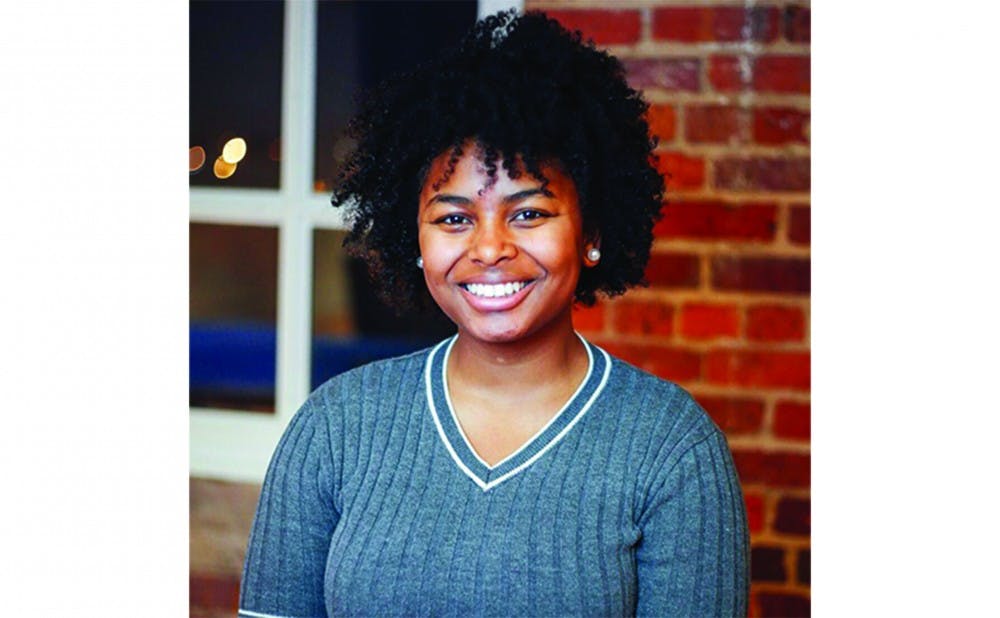Junior Tiana Horn was recently elected president of the Black Student Alliance. The Chronicle’s Claire Ballentine sat down with Horn to discuss her hopes for her tenure next year and issues on campus.
The Chronicle: What are the biggest goals you want to accomplish as president?
Tiana Horn: I’d say my biggest goals are continuing BSA’s legacy. I feel like it’s really important that we focus on being a really good community for people who identify within the black community. That’s just important because a lot of times when issues rise up, it’s important that people feel like there’s a place that they feel safe and a place where they feel welcomed. And of course, it also makes them feel like their Duke experience is a lot better—everyone wants to be accepted. So I’d say our biggest goals are building a strong community within the student body as well as being advocates for the black people around us such as staff members and faculty and other people around us whose voices right now aren’t being heard.
TC: What are you hoping to change about BSA, and what do you hope to continue?
TH: As far as changing, there are some things from my freshman year that I’d really like to see brought back. We had a mentoring program that I want to bring back, and I feel like that’s something that can help build community by connecting freshmen with upperclassmen and possibly even expanding that to alumni. My sophomore year, I did some work in changing how our general body meetings ran which helped with membership retention because, like a lot of groups, a lot of people come to the first general body meeting and then after that a lot of the upperclassmen tend to fall off. Just finding ways to increase membership engagement, that’s something I hope to continue. Continuing with the real talks and just making sure our voices are heard.
I would like to make it more inclusive of groups within the African diaspora. I would like to unite minority groups. My sophomore year, I worked on creating a unity dinner with leaders of different minority groups like Mi Gente, [Native American Student Alliance], [Asian Students Association] and next year I’d like to continue that but also expand it to reach other minority groups and include them as well, like Blue Devils United—kind of making BSA a community within the black community but also a place for other minority groups. I wouldn’t necessarily say changing anything but more expanding the foundation.
TC: What do you think the most prevalent issues on campus are right now?
TH: Right now, I would definitely say the most prevalent issue is the issue with [Executive Vice President] Tallman Trask and Ms. [Shelvia] Underwood. I feel like that just shows a gross misjustice of power, so that’s something that I believe BSA needs to be a part of and bringing more transparency to issues like that. I think that’s the biggest issue on campus. It all just stems back to building a community because building a strong black community would just catalyze a community that can stand up for other people who are mistreated who don’t have a voice or whose voices are being ignored or threatened.
TC: How do you hope to continue the progress that BSA has made this year?
TH: We’ve made a lot of progress in making sure that our voice is heard. Definitely just meeting with President [Richard] Brodhead and discussing the task force on hate and bias and making sure our voice is heard through that more than it has in the past because even the fact that the issue with Ms. Underwood, that she was treated so badly, the fact that it is just now being brought to light is just indicative of the issue with racial tensions in the institution as a whole, and I think the discussion surrounding inclusivity and racial bias is something that needs to be continued.
TC: What challenges do you anticipate facing?
TH: I feel as though my biggest challenge and the challenge of BSA is making sure the administration doesn’t try to silence us and make it seem like the issues that we care about aren’t important or should be overlooked. Because even the fact that the administration hasn’t given a concrete statement regarding the Ms. Underwood and Tallman Trask issue and that that situation has not been faced is definitely a problem. So just working with administration is always the biggest challenge, but it’s a challenge that I’m ready to face, and I think BSA is ready to face because at the end of the day we’re all here to learn, but we can’t do that if we feel that it’s not a safe environment and that we’re not welcome.

